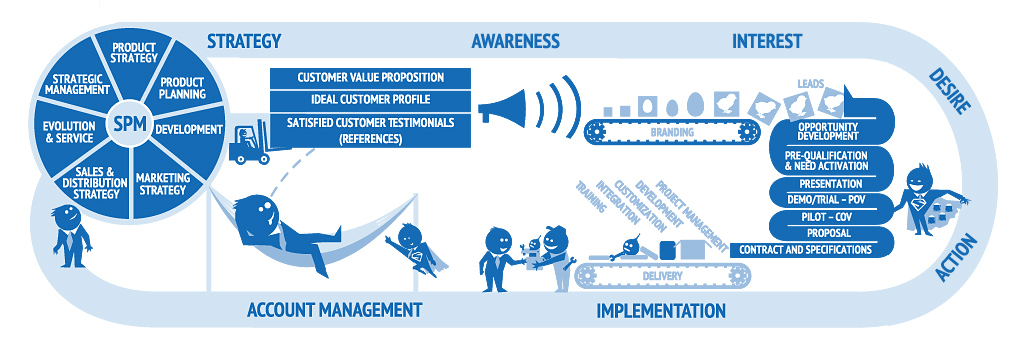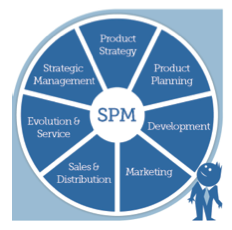If a company wants to maximize the lifetime value of its software IP assets, then they need software product management.
Why would we need a product management function? When is the right time to appoint someone to take the lead on software product management?
A product manager leads and manages one or several products from the inception to the phase-out in order to maximize life-time business value.
- The product manager works with marketing, sales, engineering, finance, quality, support, and professional services to make the products a business success.
- The product management has the business responsibility beyond a single customer project.
- The product manager determines what to make and is accountable for the business success within an entire portfolio.
- The product manager defines the “statement of direction,” the roadmap, the release plan and determines what to innovate.
- The product manager is responsible for the entire value chain of a product following the life cycle and asks: “What do we keep, what do we make, what do we stop?”
In the beginning…
In a software start-up the founders assume responsibility for R&D, product management, marketing, sales and everything else. A start-up is an interim organization in search of a business model. A start-up is in constant learning mode and the founders must be directly and intimately involved in all product, market and customer related functions.
As soon as a viable product and business model has been identified, the company moves out of the start-up phase and into adolescence. The time for scaling the business has begun. Now is the time to separate and optimize R&D, product management, marketing, sales and all the other business disciplines.
Now we need dedicated software product managers.
The software industry idiosyncrasies
Why do we say software product management?
All other industries just have “product managers” – why the difference?
The software industry is different from all other industries in so many fundamental ways that it makes perfectly good sense to deliberately highlight this fact:
- Software is invisible.
- Software has no value per se (the value is derived from using the software and the service).
- The value of the software will often depend on how well we (and our partners) deliver the services required to apply the software to current or new business practices.
- The customer’s implementation, training and adoption levels of the software has a major impact on the value derived from the product.
- The scrap value of obsolete software is nil.
- Scaling a software product based business requires no factories, inventories, trucks and retail outlets.
- “Cost of Goods Sold” for software products is typically negligible.
- R&D expenses are high.
- Customer acquisition costs are high.
- Getting the software products to customers requires no physical infrastructure (the implementation and support of the software may require an infrastructure of experts).
- Most software based business models are highly affected by network effects.
- Most software based business models are affected by Geoffrey Moore’s “Crossing the Chasm” phenomenon.
Operating as a software product manager in the software product universe requires intimate understanding of these unique environmental and framework conditions.
Why do we need software product managers?
Products managers are the mini CEO’s responsible for the lifetime value of a specific software product line. The product manager is the cogwheel between organizational units with completely different dynamics:
- Where the sales function is customer and short-term revenue driven the product manager is market value driven.
- Where R&D is technology driven, the product manager is market opportunity driven.
- Where marketing is driven by volume of leads, the product manager is market volume driven.
If a company wants to maximize the lifetime value of its software IP assets, then they need software product management.
Software Product Management Training & Certification
The TBK Academy® runs a 3 day training course for software product managers. The course follows the syllabus developed by the International Association of Software Product Managers. On the third day of the course we offer the attendees the opportunity to take the ISPMA certification test and become “ISPMA certified Software Product Manager.”




